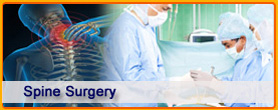Lumbar Disc Prolapse
 Disc is a cushion like structure that lie between the end surface of bones that from the spine. The disc allows movement of the spine & acts like a shock absorber. The nerves run close to the disc in the spinal canal. When a disc is damaged, the soft center may slip out (prolapse) and press on a nerve (Fig .1.)
Disc is a cushion like structure that lie between the end surface of bones that from the spine. The disc allows movement of the spine & acts like a shock absorber. The nerves run close to the disc in the spinal canal. When a disc is damaged, the soft center may slip out (prolapse) and press on a nerve (Fig .1.)
Damage to a disc may cause only back pain at first. Once a prolapse occurs resulting in pressure on a nerve, pain is felt shooting down the leg (sciatica). Pins and needles are often felt in the foot & toes. The area of skin supplied by the nerve may feel numb. Weakness of the muscles served by the nerve also occurs. The muscles of the back will be very tense and this will limits the movement. Very occasionally a large prolapse will press on nerve to the bladder thus affecting micturition (passing urine).
 Damage to a disc may cause only back pain at first. Once a prolapse occurs resulting in pressure on a nerve, pain is felt shooting down the leg (sciatica). Pins and needles are often felt in the foot & toes. The area of skin supplied by the nerve may feel numb. Weakness of the muscles served by the nerve also occurs. The muscles of the back will be very tense and this will limits the movement. Very occasionally a large prolapse will press on nerve to the bladder thus affecting micturition (passing urine).
Damage to a disc may cause only back pain at first. Once a prolapse occurs resulting in pressure on a nerve, pain is felt shooting down the leg (sciatica). Pins and needles are often felt in the foot & toes. The area of skin supplied by the nerve may feel numb. Weakness of the muscles served by the nerve also occurs. The muscles of the back will be very tense and this will limits the movement. Very occasionally a large prolapse will press on nerve to the bladder thus affecting micturition (passing urine).
Treatment
 In majority of the cases conservative (physiotherapy and bed rest) and medical line of treatment will reduce the pain. However some of the patients may not recover completely. Hence may require surgery. Surgery is carried out to relieve persisting pain and to arrest further neurological deficit. Advanced spinal surgical procedure like micro lumbar discectomy and micro endoscopic discectomy are offered to the patient. Both these techniques are keyhole procedures performed through a small incision on the back.
In majority of the cases conservative (physiotherapy and bed rest) and medical line of treatment will reduce the pain. However some of the patients may not recover completely. Hence may require surgery. Surgery is carried out to relieve persisting pain and to arrest further neurological deficit. Advanced spinal surgical procedure like micro lumbar discectomy and micro endoscopic discectomy are offered to the patient. Both these techniques are keyhole procedures performed through a small incision on the back.
| Copyright © 2025 www.dheerajbojwani.com All rights reserved. |
























